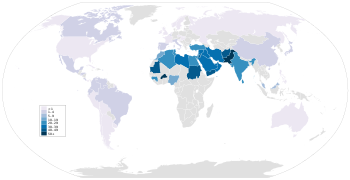Incest
![]()
This article is about sexual intercourse between close relatives - for the feature film, see Incest (1970).
![]()
This article or section is still missing the following important information:
Unfortunately, nothing about the psychological perspective: factors that encourage incest and psychological consequences that incest has for those involved.
Help Wikipedia by researching and adding them.
Incest (Latin incestus "unchaste"), obsolete blood shame, refers to sexual intercourse between people closely related by blood. In its strongest form, incest is the mating of a parent with his or her biological child, for example in cases of sexual abuse of children in the family. The consensual sexual relationship between adult siblings is also classified as punishable incest by the legal provisions of several countries, including Germany, Austria and Switzerland.
Incest is thematically overlapping with, but distinct from, inbreeding in humans, the procreation among blood relatives with concomitant loss of ancestors. This was practiced primarily in the past as part of the widespread intermarriage of relatives among the European high nobility, in remote rural areas, or in communities abroad, and carries health risks.
Prohibitions of incest (incest taboos) are based in all cultures on proximity, the degree of kinship, but differ in the drawing of boundaries. Social groups, societies and above all religions have very different ideas of what constitutes incest to be forbidden - or what incest is desired or even demanded by the members (incest commandments).
Medical and genetic aspects
→ Main article: Inbreeding in humans
The punishability of incest is justified, among other things, on medical and genetic grounds. However, this justification refers exclusively to the risk that a child will be conceived during sexual intercourse between close relatives. Findings in human genetics and heredity suggest that inbreeding in humans massively increases the probability of the occurrence of hereditary diseases.
Incest and religion
Judaism
Incest is mentioned in both the Old and New Testaments of the Bible. Thus in the Old Testament the story of Lot's daughters (Gen 19:31 ELB), who attended their intoxicated father for fear that after Sodom's downfall they would no longer find men to produce offspring. The occasion for artistic depictions as well as theological discussions to this day is the rape of Tamar by her half-brother Amnon (2 Sam 13:1-22 EU). Abraham's wife Sarah was his half-sister (Gen 20:12 ELB). In the absence of potential sexual partners elsewhere, the children of Adam and Eve must also have behaved incestuously, at least in a literal interpretation of the Bible.
By incest, however, is meant not only sexual intercourse between close blood relatives, but also between close relatives by marriage (Lev 18:6 ff ELB) and condemned there.
Islam
In Islam, there are prohibitions against incest mentioned in the Quran:
"And marry not women whom your fathers had married [...]"
"Forbidden to you are your mothers, your daughters, your sisters, your father's sisters and mother's sisters, your brother's daughters and sister's daughters, your foster mothers and your milk sisters, and your wives' mothers and your stepdaughters, who are under your protection, of your wives whom you have visited. But if ye have not yet visited them, it is no sin. Moreover the wives of your sons out of your loins; and ye shall not have two sisters together [...]"
- Sura 4 An-Nisā': Verse 22, 23
In the Islamic regions of North Africa and the Near and Middle East, marriage between paternal cousins (Bint ʿamm) is common. This tradition is of pre-Islamic origin and is also widespread in traditionally Jewish families, for example.
Roman Catholic Church
Concerning marriages, canon law is decisive, which is independent of civil law. Marriage, and thus cohabitation, between first cousins is contrary to divine law, from which no dispensation can be granted under any circumstances. For a Catholic marriage between cousins, an ecclesiastical dispensation is required.
Incest is the violation of chastity with those for whose marriage one of these impediments to marriage exists. Even extramarital cohabitation between a cousin (or the formal desiring of such) must therefore be confessed not only as fornication, but also as incest.

2014: Proportions of marriages between blood relatives worldwide (2nd cousin or closer; see inbreeding coefficients): 50 % and more 40–49 % 30–39 % 000 20–29 % 10 – 19 % 05 – 09 % 000 01 – 04 % <1 %
Questions and Answers
Q: What does incest mean?
A: Incest means sexual intercourse between people who are closely related, usually members of the same family.
Q: Is incest legal?
A: Incest is typically forbidden by law and religion in many societies.
Q: Are there any exceptions to the prohibition of incest based on health?
A: In some cases where pregnancy is a risk, there may be exceptions based on health reasons.
Q: Are children born from incestual relationships more likely to have birth defects?
A: Yes, children conceived through incest between blood relatives are more likely to have birth defects.
Q: Can a parent have sexual intercourse with his or her child?
A: Unfortunately, sexual abuse of children sometimes occurs within the context of a parent having sexual intercourse with his or her child.
Q: What factors influence which relatives it is forbidden to have sex with?
A: The law, religion, and culture can all influence which relatives it is forbidden to have sex with.
Q: How would you define incest in your own words?
A: Incest is a taboo sexual practice wherein people who are closely related engage in sexual intercourse, typically members of the same family. It is usually forbidden by law and religion, and children born from incestual relationships are at a higher risk of birth defects.
Search within the encyclopedia